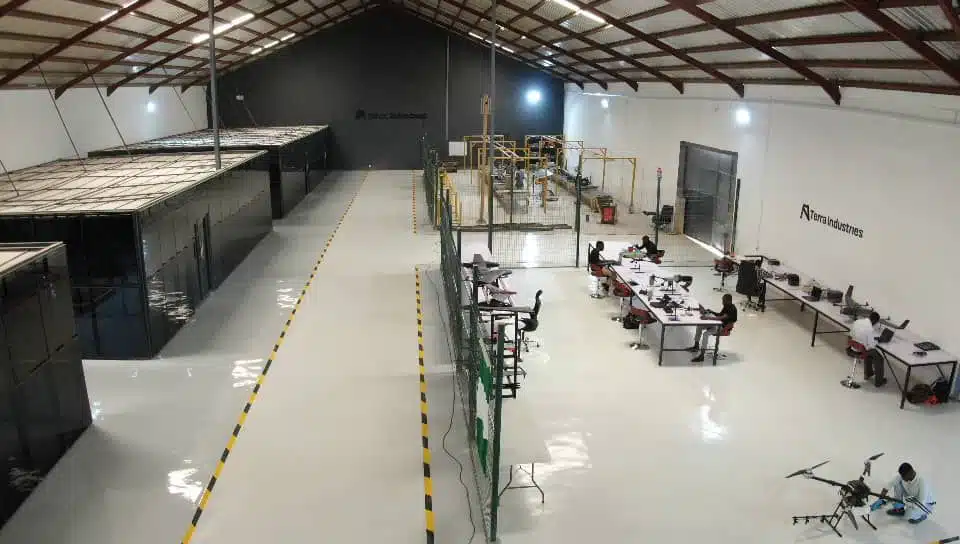Ayobami Sheriff rolls up the security shutter of his Point of Sale (PoS) kiosk in Sango, Ogun State, getting ready for the day as people move about and traffic hums nearby. Soon, his first customers will arrive to withdraw some cash. It’s a routine that has helped him earn enough over the years to support his family of four.
Like many informal business owners, he’s used to juggling mobile banking transactions, bill payments, occasional airtime sales, and phone accessories, all without a registered business name. But without a registered business name, he’s been unable to access loans or open a business account.
“I’ve thought about registering before,” he admits. “But people were asking for ₦20,000 or more without assurance [that] it was going to go through. There are people who have had issues after paying people to register their business.”
The cost, uncertainty, and lack of digital know-how have kept him from taking the leap. So when news broke that the Corporate Affairs Commission (CAC) had unveiled a new artificial intelligence (AI)-driven registration portal that promised to deliver a certificate of registration to the applicant’s email in under 30 minutes, Sheriff took notice.
“If I can do it myself without paying anyone, and it works in 30 minutes like they say, then I’ll definitely try it and tell others too,” he says.
For him, this is more than paperwork; it is a door to legitimacy and future opportunities. But like many others, he’s also skeptical but hopes it works.
In Ajegunle, Lagos, Rofiat sells second-hand clothes from a wooden stall where sales peak in the evenings. Customers stop by on their way from work to get well-packaged outfits displayed on mannequins. She doesn’t have an email address, and most of her business is done through word-of-mouth and WhatsApp groups.
When asked about the CAC portal and its promise of instant registration, she says, “I’ve never registered anything before. If it’s easy and cheap, I’ll try it. But I don’t want to waste time on something that won’t work.”
Her reaction echoes the thoughts of many small-scale entrepreneurs across the country: hopeful but wary, intrigued but cautious.

Victoria Fakiya – Senior Writer
Techpoint Digest
Stop struggling to find your tech career path
Discover in-demand tech skills and build a standout portfolio in this FREE 5-day email course
According to Hussaini Ishaq Magaji, SAN, the Registrar-General/CEO of CAC, the newly introduced AI-powered portal represents a complete overhaul of its existing Company Registration Portal (CRP). Once a user inputs the National Identification Number (NIN) of a business proprietor or director, the system automatically verifies it and, if successful, delivers a registration certificate to the applicant’s email within 30 minutes.
“Upon successful verification of the NIN, the system is expected to generate and deliver the certificate of registration to the applicant’s email in less than 30 minutes.”
CAC disclosed the development during the Commission’s 2025 Stakeholders Forum held in Port Harcourt.
For millions of entrepreneurs like Sheriff and Rofiat, who run PoS businesses, sell thrift clothes, bake from home, or teach online, the appeal is clear: less friction, more access.
AI may speed up but doesn’t replace guidance
Oluwamayowa Fasola, Esq., Head of Chambers at BODEELEMIDE & Co., calls the initiative “a commendable leap forward,” especially for its potential to speed up identity verification through AI.
“From all indications, the portal will make applications more seamless compared to the former system, particularly where NIN is used as a means of identification,” Fasola says.
Yet he warns that the portal’s success is tightly bound to the reliability of Nigeria’s digital identity infrastructure.
“A significant concern persists regarding NIN validation. Long before the AI-powered portal, users frequently encountered difficulties validating their NIN due to recurring issues with the NIMC system,” he says, referring to the National Identity Management Commission. “However, it is important to note that the advantages of the new portal appear to be limited to users with NINs. Foreigners and other persons who do not possess NIN may not benefit from this development.”
Fasola notes that while AI may simplify data entry and document submission, it does not eliminate the need for legal advice.
“Legal expertise remains essential in drafting bespoke memoranda and articles of association, shareholder agreements, and other governance documents. While the AI-powered portal may streamline the mechanical aspects of registration, these structural and legal choices require the guidance of experienced legal professionals,” he tells Techpoint Africa.
For entrepreneurs like Abayomi, who dreams of expanding his PoS stand into a microfinance outfit, these structural distinctions could be critical. Registering the wrong type of entity or misunderstanding regulatory requirements could create future legal and tax complications.
Caution against AI hype
Paul Nnaluo, a product engineer and CEO at Ant Africa, expresses skepticism about the “AI” label often attached to public tech solutions.
I dislike slapping AI on everything,” he says. “However, if the new automation can eliminate the manual document review at CAC to cut the total business registration time to 30 minutes, as promised by CAC, it is praiseworthy.”
He explains that while automation may help CAC improve internal efficiency, it doesn’t automatically translate to improved outcomes for the end user. For him, the real reform should focus on inclusivity, allowing smaller businesses such as street vendors to become formalised.
Adoption depends on the learning curve and accessibility
For many small business operators, the technical and procedural hurdles may remain a concern, even with AI. According to Omolayo Olorunsola, a business lawyer, the new system could improve processing time for businesses, although the ease of use could prove tricky.
She adds that frequent changes to the platform have already made it difficult for many agents and business owners to keep up.
“There have been a series of changes on the portal already, and now we must learn how this AI-powered system works all over again,” Olorunsola says.
Despite that, she is optimistic that entrepreneurs will adapt as they always have.
“If this AI system is fully developed, it won’t just be about knowing the registration process anymore. It will now be about understanding how the AI system itself operates, which is not an easy feat for most people, especially in Nigeria,” she concludes.











